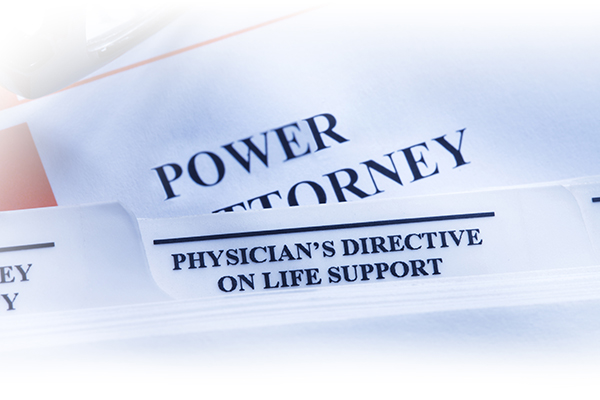Information on Durable Power of Attorney

Various legal mechanisms can assist in the management of assets and health care when a person becomes incapacitated. Make it a priority to make these arrangements before, rather than after, they are needed. Below is some basic information on Durable Power of Attorney and Durable Power of Attorney for Health Care to assist in your preparations for your loved ones, should they become incapacitated.
Because laws vary from state to state, you should consult with an attorney who is knowledgeable in estate and assets management for assistance in legal planning.
Durable Power of Attorney
Q: What is a Durable Power of Attorney for Property?
A Durable Power of Attorney for Property (DPA) is a document that allows you (the principal) to give authority to another person (your agent or attorney-in-fact) to make financial/legal decisions and financial transactions on your behalf. It is called “durable” when, by its terms, it remains effective even if the principal becomes mentally incompetent.
Q: Who can serve as attorney-in-fact?
It need not be an attorney: any trusted adult, such as a spouse, partner, relative or friend can serve as attorney-in-fact. Also, there are several nonprofit agencies that can fill this role. Your attorney-in-fact will have broad authority, and it is critical that the person or agency you choose be trustworthy and sensitive to your wishes.
Q: What powers can I give to my attorney-in-fact?
The powers you give your attorney-in-fact can be as limited or as broad as you like, and can include the power to buy property, to invest, to contract, to engage in tax planning, to make gifts, and, very importantly, to plan for government benefits, such as Supplemental Security Income and Medicaid (Medi-Cal in California). For example, the attorney-in-fact can be given authority to transfer the principal residence to your spouse if you need to be in a nursing home or require government assistance.
Q: What are the advantages of a Durable Power of Attorney?
A DPA is a relatively easy, inexpensive mechanism for allowing another person to handle your legal and financial affairs. Unlike a joint tenancy bank account, which people often use as a management device in the event of incapacity, a DPA does not give your attorney-in-fact legal access for his or her own use. Your attorney-in-fact must use your assets for your benefit, and a DPA ceases to be effective when the principal dies.
Q: What are the disadvantages of a Durable Power of Attorney?
The main disadvantage of a DPA is that it is subject to abuse because there is no ongoing court supervision of the attorney-in-fact. This differs from a conservatorship or guardianship, under which a conservator is required to submit an ongoing accounting to the court. If the attorney-in-fact abuses his or her authority and acts improperly, a court may step in and take action. However, in many cases, the damage is already done, and it is difficult to undo it. Thus, you should take great care in selecting your attorney-in-fact.
Durable Power of Attorney for Health Care
Q: What is a Durable Power of Attorney for Health Care (DPAHC)?
A DPAHC is an Advance Directive that allows you to appoint a health care agent (also known as an attorney-in-fact, a proxy, or a surrogate) to make health care decisions for you in the event that you can no longer speak for yourself. Every state recognizes a DPAHC, but laws governing Advance Directives vary from state to state.
Q: What if I am competent to make my own health care decisions?
Unless you stipulate otherwise, your health care agent makes decisions for you only if you are no longer able to make health care decisions for yourself.
Q: If I have filled out a Living Will, do I also need a DPAHC?
It is a good idea to complete a DPAHC in addition to a Living Will, or to combine them in one document. A Living Will usually allows you to state your desires regarding life-sustaining treatment in the event that you become terminally ill or permanently unconscious. Most states include these types of instructions in their DPAHC forms. By selecting a health care agent through a DPAHC, you ensure that someone you trust will oversee decisions and implement your wishes regarding any treatment, not just life-sustaining treatment.
Q: What powers can I give my health care agent?
A DPAHC allows you to give your health care agent as broad or as limited powers as you like. While state laws may vary, the powers you can give to your agent usually include:
-
- The right to select or discharge care providers and institutions
- The right to refuse or consent to treatment
- The right to access medical records
- The right to withdraw or withhold life-sustaining treatment
Q: Who should I choose as a health care agent?
You should choose a person whom you trust, such as a spouse, partner, family member or close friend. The person you choose should know your personal values and beliefs. If possible, you will want to choose someone who lives in your area in case he or she is called upon to direct your treatment for an extended period of time. You will want to discuss your health care wishes with your agent and be sure he or she is willing to act on your behalf.
Q: Where can I find DPAHC forms and instructions?
A local hospital, Long-Term Care Ombudsman program, senior legal service or senior information and referral program, a local or state medical society, or your physician will usually have forms appropriate for your state. Some medical centers offer classes in preparing Advance Directives.
Caregiver.org
